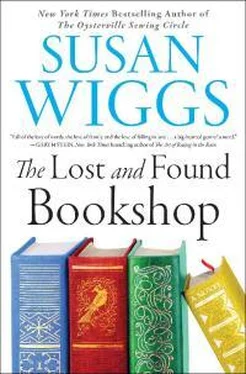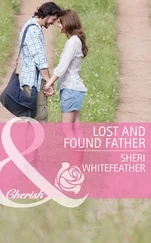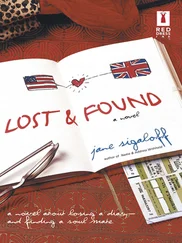Natalie took a bite of the soft, sugared ginger-molasses cookie. She wasn’t sure being someone’s greatest accomplishment was as important as it sounded.
“We had to draw a picture of our family and I felt weird about it.” She took her sketch out of her backpack and laid it on the counter. She had drawn the people as precisely as she could—her mother’s wavy black hair, Grandy’s wonderful height, her own missing front tooth, May Lin’s half-moon smile, and Gilly the shop cat, curled into a marmalade-colored ball.
“What made you feel weird?”
In her mind’s eye, Natalie envisioned the other kids’ drawings. Most of them featured a mom, a dad, and a brother or sister or two, always with a lovely house in the background. There were a few Mrs. Blessing called “blended families,” which sounded very nice, like a special drink at the Rainbow Soda Fountain down the street. And then there was Calvin with his two daddies, and Anson with his two mommies, which wasn’t a big deal on account of this being San Francisco and all. No one would ever say anything mean about families like that. Mom was always pointing out that lots of kids had single moms. Still, when it came to Natalie, there were questions.
“How come you have a grandfather but no father?” she’d been asked.
“Who’s that Chinese lady?” Kayla had demanded.
“She lives with us,” Natalie explained.
“Is she, like, your maid? Your nanny?”
Most of the kids at Natalie’s school had both maids and nannies, because this was an Expensive Neighborhood and they all lived in houses or even mansions, not apartments tucked above a bookshop.
“Well?” Kayla had prodded.
Natalie had wanted so badly to lie, but she was really bad at lying. “She’s my grandfather’s friend.”
“Like his girlfriend?”
“I guess so.” For some reason, she had been embarrassed by the conversation. She looked up at her mom and decided not to mention that particular exchange.
“No one gets to tell you what to think or how to feel,” Mom said. “That’s your choice.”
“Then why do I feel like a freak? ’Cause I sure as heck wouldn’t choose that .”
Her mother looked at her. Then a spark lit her eyes. “Over here,” she said, gesturing at the children’s section.
Oh boy. A Book Talk, her mother’s specialty. Natalie finished her cookie and chased it down with a final gulp of milk, then washed her hands at the sink. She did like books and reading, but sometimes she just wanted to talk to her mom. She listened, though, because her mother never failed to find the exact-right perfect book, and she read it in a way that made you want to listen forever.
As always, her mother was right. There was a book for everything. Somewhere in the vast Library of the Universe, as Natalie thought of it, her mom could find a book that embodied exactly the things Natalie was worrying about.
And sure enough, Maya Running , about a girl from India whose family didn’t fit in, did make her feel better. Like she wasn’t the only kid in the world with a different kind of family. You’re never alone when you’re reading a book , Mom liked to say.
* * *
At the end of the song, Natalie returned to the podium carrying a book and her folder of notes, along with a packet of tissues. With an excess of care, she opened the book and lowered the mic. “I’m Natalie,” she said. “Blythe’s daughter.”
Almost immediately, her throat was clogged by tears that scalded her with pain. She started to panic, because she desperately wanted to be heard. Big swallow. Deep breath. She had awakened early this morning in order to practice getting through her piece without falling apart. One recommended technique was to squeeze the flesh between her index finger and thumb as hard as she could, letting the pinch remind her to keep it together.
“Books were my mother’s world, but she was mine. We lived in the apartment above the shop, and every day with my mom was an adventure. We didn’t travel far on vacations because of the shop.”
Natalie used to beg to travel the world the way her friends did on school holidays—Disneyland, Hawaii, London, Japan. Instead, her mom would take her on flights of the imagination to Prince Edward Island, to Sutter’s Mill, to Narnia and Sunnybrook Farm, to outer space and Hogwarts.
She tried her best to bring her mother back to life with a few key anecdotes and memories smeared by tears. And then she looked down at the page she’d read many times growing up—from The Minpins by Roald Dahl. “The first time my mother read this book to me was after a visit to the Claymore Arboretum. I was five years old, and I believed the dragonflies were fairies, and that tiny sprites rode around on the backs of songbirds. She let me go on thinking that for as long as I pleased. And as far as I’m concerned, that’s the best parenting advice ever.”
She breathed in, imagining the comfortable scent of her mother’s bathrobe as they snuggled together for their nightly story. She breathed out, hoping her words would somehow touch her mother one more time.
“‘And above all, watch with glittering eyes the whole world around you because the greatest secrets are always hidden in the most unlikely places. Those who don’t believe in magic will never find it.’”
Natalie closed the book and hugged it to her chest the way she used to do as a child. When she spoke again, her voice was surprisingly, gratifyingly steady. “I could keep you here all day with stories about my mother,” she said. “Mom wouldn’t have liked that, though. She always believed we’re all capable of living our own stories, and nothing else can compare to that. So I will leave you with this: thank you.”
5
Amid the babble of music and conversation that followed the memorial, Natalie was swept up in a wave along with everyone else. At the catered reception, she was buoyed by the energy of the mourners. She rode that wave, even though she knew that its power came from the deepest sadness. She let it catch her, pulling her along like a leaf dropped into a swift river current.
At the end of the day, the energy dwindled. People promised to stay in touch—a promise she doubted. They urged her to reach out if she needed anything—anything at all. Everyone went back to their own lives, their work and their worries, their families and friends. When they walked into their homes or offices or boarded a plane or train, they returned to the same world they had left.
For Natalie, this was not the case. For her, nothing would ever be the same. She now knew that the aftermath of acute and sudden grief was different, a horrible realm she’d never explored, like an unread book on the shelf. When she stepped into the shop that evening, she felt an emptiness so vast that she almost couldn’t breathe. Everything had drained out of her.
“It’s exhausting, isn’t it?” asked Grandy. “A sadness like this. It’s physically exhausting.”
“You’re right,” she said, watching him through the dim security lights of the shop. “Let’s both turn in early.”
As he made his way down the hall, he seemed diminished. They had not yet talked about what would happen now that Blythe was gone. Natalie knew it was going to be a difficult, painful conversation about decisions they weren’t ready to make.
After a few minutes, she tapped at his door and stepped into the room. He was in his flannel pajamas with the piped edges and a pair of old leather scuffs. There were pills and a glass of water on the nightstand along with a stack of books. In the corner, the old iron radiator served as a shelf for the collection of literature and keepsakes from the ceremony.
“Can I get you anything?” she asked.
Читать дальше












